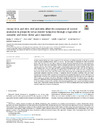Identificador persistente para citar o vincular este elemento:
https://accedacris.ulpgc.es/jspui/handle/10553/108003
| Campo DC | Valor | idioma |
|---|---|---|
| dc.contributor.author | El Kertaoui, Najlae | en_US |
| dc.contributor.author | Lund, Ivar | en_US |
| dc.contributor.author | Betancor, Monica B. | en_US |
| dc.contributor.author | Carpentier, Camille | en_US |
| dc.contributor.author | Montero Vítores, Daniel | en_US |
| dc.contributor.author | Kestemont, Patrick | en_US |
| dc.date.accessioned | 2021-06-25T10:12:11Z | - |
| dc.date.available | 2021-06-25T10:12:11Z | - |
| dc.date.issued | 2021 | en_US |
| dc.identifier.issn | 0044-8486 | en_US |
| dc.identifier.other | Scopus | - |
| dc.identifier.uri | https://accedacris.ulpgc.es/handle/10553/108003 | - |
| dc.description.abstract | Several causative factors have been proposed for the occurrence of skeletal anomalies in fish larvae, among which we quote nutritional factors, such as LC-PUFAs. This study aimed to investigate the effect of different dietary DHA and ARA level and ratio on pikeperch (Sander lucioperca) larval development and performance, digestive capacity, fatty acids composition, skeleton anomalies and molecular markers of oxidative stress status (sod, gpx, and cat), stress response (StAR, gr, pparα, hsl and pepck), fatty acid synthesis (fadsd6, elovl5), eicosanoids synthesis (pla2, cox2, lox5, pge2, and lta4h), and bone development (twist, mef2c, sox9, and alp). Pikeperch larvae were fed six microdiets containing two different dietary levels of DHA (0.5% and 3.5%) combined with three levels of ARA (1.2%, 0.6%, and 0.3%). Dietary fatty acid changes did not affect growth performance but significantly influenced enzymatic activities. A significant increase in skeletal anomalies with DHA intake increment was recorded. StAR, cox2, pla2 and hsl expression were significantly depressed in 2.5% DHA larvae. An opposite effect of dietary DHA elevation was recorded in gpx expression. Both DHA and ARA had a significant effect on pparα, gr, and pge2 expressions. Although no significant interactions were found, pge2, gr, and pparα displayed a differential pattern of expression between the different treatments. A strong association was found for the larval tissue amount of ARA and DHA with eicosanoid metabolism, stress response and skeleton anomaly related genes. These results denoted the effects of dietary LC-PUFAs on immune/stress gene regulation and their potential implication in skeleton development. | en_US |
| dc.language | eng | en_US |
| dc.relation | Exploring The Biological And Sociio-Economic Potential Of New/Emerging Candidate Fish Species For The Expansion Of The European Aquaculture Industry | en_US |
| dc.relation | AQUAculture infrastructures for EXCELlence in European fish research towards 2020 | en_US |
| dc.relation.ispartof | Aquaculture | en_US |
| dc.source | Aquaculture [ISSN 0044-8486], v. 544, 737060 (Noviembre 2021) | en_US |
| dc.subject | 310502 Piscicultura | en_US |
| dc.subject.other | Pikeperch | en_US |
| dc.subject.other | Skeletal anomalies | en_US |
| dc.subject.other | LC-PUFA | en_US |
| dc.subject.other | Stress gene | en_US |
| dc.subject.other | Larvae | en_US |
| dc.title | Dietary DHA and ARA level and ratio affect the occurrence of skeletal anomalies in pikeperch larvae (Sander lucioperca) through a regulation of immunity and stress related gene expression | en_US |
| dc.type | info:eu-repo/semantics/article | en_US |
| dc.type | Article | en_US |
| dc.identifier.doi | 10.1016/j.aquaculture.2021.737060 | en_US |
| dc.identifier.scopus | 85109030381 | - |
| dc.contributor.orcid | NO DATA | - |
| dc.contributor.orcid | NO DATA | - |
| dc.contributor.orcid | NO DATA | - |
| dc.contributor.orcid | NO DATA | - |
| dc.contributor.orcid | NO DATA | - |
| dc.contributor.orcid | NO DATA | - |
| dc.contributor.authorscopusid | 56899072300 | - |
| dc.contributor.authorscopusid | 23025364000 | - |
| dc.contributor.authorscopusid | 26431740800 | - |
| dc.contributor.authorscopusid | 57208884186 | - |
| dc.contributor.authorscopusid | 35605929400 | - |
| dc.contributor.authorscopusid | 7003399118 | - |
| dc.relation.volume | 544 | en_US |
| dc.investigacion | Ciencias | en_US |
| dc.type2 | Artículo | en_US |
| dc.description.numberofpages | 13 | en_US |
| dc.utils.revision | Sí | en_US |
| dc.date.coverdate | Noviembre 2021 | en_US |
| dc.identifier.ulpgc | Sí | en_US |
| dc.contributor.buulpgc | BU-BAS | en_US |
| dc.description.sjr | 0,981 | |
| dc.description.jcr | 5,135 | |
| dc.description.sjrq | Q1 | |
| dc.description.jcrq | Q1 | |
| dc.description.scie | SCIE | |
| item.fulltext | Con texto completo | - |
| item.grantfulltext | open | - |
| crisitem.author.dept | GIR Grupo de Investigación en Acuicultura | - |
| crisitem.author.dept | IU de Investigación en Acuicultura Sostenible y Ec | - |
| crisitem.author.dept | Departamento de Biología | - |
| crisitem.author.orcid | 0000-0002-4358-2157 | - |
| crisitem.author.parentorg | IU de Investigación en Acuicultura Sostenible y Ec | - |
| crisitem.author.fullName | Montero Vítores, Daniel | - |
| crisitem.project.principalinvestigator | Izquierdo López, María Soledad | - |
| crisitem.project.principalinvestigator | Afonso López, Juan Manuel | - |
| Colección: | Artículos | |
Citas SCOPUSTM
14
actualizado el 08-jun-2025
Citas de WEB OF SCIENCETM
Citations
12
actualizado el 08-jun-2025
Visitas
126
actualizado el 11-may-2024
Descargas
430
actualizado el 11-may-2024
Google ScholarTM
Verifica
Altmetric
Comparte
Exporta metadatos
Los elementos en ULPGC accedaCRIS están protegidos por derechos de autor con todos los derechos reservados, a menos que se indique lo contrario.
